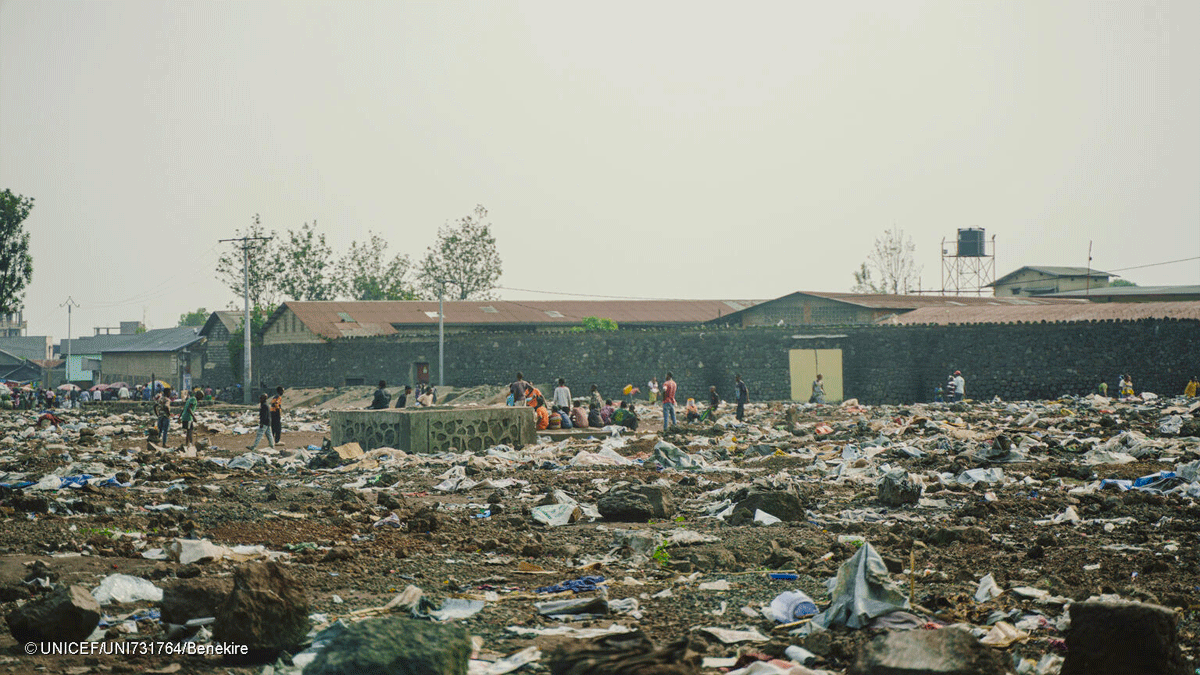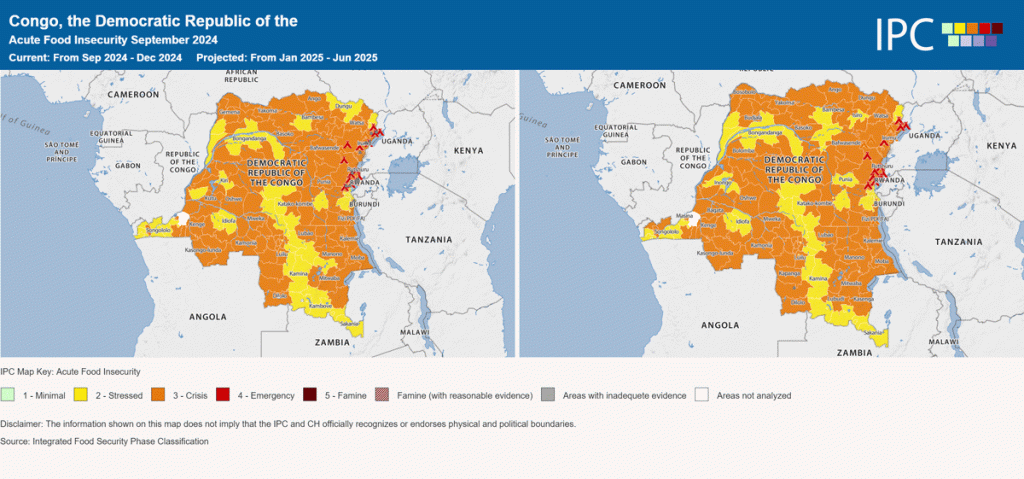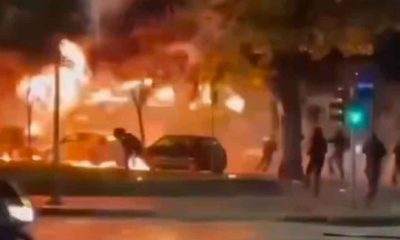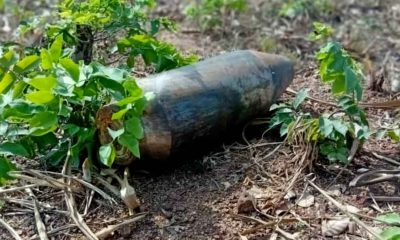International News
M23 Rebels Capture Second Regional Capital in the Democratic Republic of Congo
M23 rebels advanced over 90 kilometers in two weeks amid growing accusations of war crimes.

[WBHG NEWS] – After violating their self-declared 4 February ceasefire, Rwandan-backed M23 rebels secured the city of Bukavu, advancing over 90 kilometers in two weeks from occupied Goma.
“Rwanda-backed rebels have occupied a second major city in mineral-rich eastern Congo,” Congo’s government said Sunday. Militants occupied the governor’s office and pledged to sweep away the “old regime.”
The Congolese Army was in collapse and offered almost no resistance as the much smaller M23 rebel force and Rwandan army swept to the south coast of Lake Kivu and secured more of the mineral-rich region. On Saturday, Congolese soldiers retreated with thousands of panicked civilians as the geopolitical and humanitarian crisis worsened. Up to 15,000 refugees crossed into Burundi, Africa’s poorest country, amid the violence.
The capture of Bukavu essentially seals both major border crossings into Rwanda and enables the Rwandan Army and M23 rebels to use Lake Kivu for supplies and logistics.
On Tuesday, the U.N. reported that humanitarian aid warehouses were looted in the South Kivu province as social order broke down. The U.N. Human Rights Office (OHCHR) confirmed that M23 rebels executed three children in Bukavu.
“Our Office has confirmed cases of summary execution of children by M23 after they entered the city of Bukavu last week. We are also aware that children were in possession of weapons. We call on Rwanda and M23 to ensure that human rights and international humanitarian law are respected,” said OHCHR spokesperson Ravina Shamdasani.
There were additional credible reports of more extrajudicial executions, arbitrary arrests, and threats made to journalists, human rights workers, judges, lawyers, and other civil service employees. French news agency AFP confirmed that two people were “lynched” by a mob who accused them of looting.
So far, Diplomatic Efforts have Failed
U.N. Secretary-General Antonio Guterres called for the territorial integrity of the Democratic Republic of Congo (DRC) to be preserved. “The fighting that is raging in South Kivu – as a result of the continuation of the M23 offensive – threatens to push the entire region over the precipice,” Guterres warned the African Union during an emergency summit.
African Union Peace and Security Commissioner Bankole Adeoye said regional leaders are increasingly worried that the ongoing conflict in the eastern part of the DRC will escalate into “an open regional war” over resources. During the summit, Rwanda was accused of providing supplies and logistics provided by China to the M23 rebels. Kigali has repeatedly denied the accusations.
Stéphane Dujarric, the spokesman for U.N. Secretary-General Guterres, said that MONUSCO was protecting 1,400 civilians and NGO workers at the peacekeeping base in Goma. Fighting between M-23 and their Rwandan army backers and the Congolese Army has left 80 schools and 27 healthcare centers severely damaged.
South African and Malawian peacekeepers from the Southern African Development Community Mission in DRC (SAMIDRC) and the United Nations Organization Stabilization Mission in the Democratic Republic of the Cong (MONUSCO) remain trapped at Goma Airport and the nearby town of Saké. South Africa’s Minister of Defense, Angie Motshekga, said the top priority was evacuating 14 dead South African soldiers and the wounded. She insisted that the SAMIDRC mission would continue despite the violence and growing tension between Congolese, Rwandan, and South African leaders.
On Monday, Uganda’s military commander, Muhoozi Kainerugaba, threatened to launch an offensive on the DRC city of Bunia, claiming, without evidence, that ethnic Bahima were being killed.
A Country of Contradictions and Bloodshed
Decades of war, instability, and corruption have killed an estimated 6 million people in the DRC since 1996. M23, or March 23, was formed in 2012 and is composed primarily of ethnic Congolese Tutsis backed by the Rwanda government. Both claim that M23 is a required force to prevent ethnic Hutus from carrying out another genocide like the one in Rwanda in 1994. The international community has repeatedly rejected these claims.
The DRC is the 10th largest country on the planet and the 5th wealthiest in terms of natural resources. Despite abundant water, high-quality copper ore, and vast amounts of rare earth elements, the Congolese are the ninth poorest in Africa in terms of GDP per capita and ranked 181st in the world.

IPC Acute Food Insecurity Map for the Democratic Republic of Congo, September 2024
Over 3.4 million people are “facing critical levels of food insecurity,” according to the latest report by the IPC. Another 22.4 million people, 19% of the population, are facing “crisis levels” of food insecurity. The September 2024 report was released prior to the dramatic increase in fighting and the suspension of humanitarian aid by the U.S.
Today, 80% of all coltan ore comes from the DRC, and 80% of the mining operations are controlled or financed by China. Coltan is refined into cobalt, which is used in a wide range of applications, including dyes, semiconductors, and rechargeable batteries.
Coltan also produces tantalum, which is used to manufacture capacitors found in almost all smartphones, computers, and electronics. In April 2024, M23 took over one of the most productive coltan mines and has been illegally exporting raw ore to Rwanda ever since.
According to a 7 January report by the U.N., M23 is earning at least $800,000 a month through the illegal mining operation just at the Rubaya Mine. Satellite images, documents, and public import/export records show how coltan ore is removed from the facility to Rwanda and then mixed with lower-quality domestically sourced ore. In 2023, the most recent year records are available, Rwanda recorded a staggering 50% increase in coltan ore exports compared to 2022. The total tonnage exceeded domestic production.
China’s interest in the DRC appears to go beyond extracting mineral wealth. While Beijing has never been formally accused of arming the M23 rebels, pictures and videos show the group is well-equipped with Chinese kit and weapons.
The Congolese Army is considered weak, poorly trained, and corrupt. Since M23 expanded its offensive in late, the army has suffered repeated humiliating defeats, with thousands of soldiers deserting. Last month in Goma, over 400 Romanian mercenaries, allegedly providing “training” and operating artillery, crossed the border into Rwanda and surrendered, abandoning their infantry mobility vehicles and weapons.
The other powers with influence on the continent, the United States, Russia, and France, have limited economic and military exposure in the DRC and Rwanda.
Türkiye was the first country to sell military equipment to the DRC three months after an international ban was lifted in late 2022. In 2024, Turkish armored vehicle manufacturer Katmerciler completed a multi-million dollar contract for 185 mine-resistant infantry mobility vehicles. Türkiye has also sold arms to Rwanda but on a much smaller scale.
In late 2024, Russia deployed a very small group of troops with the Rosgvardiya Afrika Corps, formerly known as Private Military Company Wagner Group, to the DRC. The Russian soldiers are not in the eastern part of the country, and their role remains unclear.
USAID Employees Flee as Russia Moves In
Last week, several employees with USAID and the State Department filed a lawsuit against the Trump Administration, claiming that they and their families were abandoned in the DRC capital of Kinshasa. On 28 January, rioters attacked the U.S. embassy and nine others, lighting fires, breaching fences, and looting the buildings. Widespread unrest spread across the city, with protesters targeting groups and countries they viewed responsible for the fighting on the Rwandan border.
On the same day, the U.S. closed its embassy “to the public until further notice” due to
”an increase in violence.” Embassy officials advised citizens to “shelter-in-place and then safely depart while commercial options are available.”
The lawsuit revealed the security situation in Kinshasa, over 1,500 kilometers west of the fighting, is far worse than initially reported. Court records show that one USAID employee and their family had to be extracted from their home by the U.S. Marine contingent assigned to the embassy after protesters breached the outer wall and set their home on fire.
Some U.S. government employees said the State Department abandoned them when they received notices on 4 February that they were being placed on leave despite being trapped.
Others opted to evacuate in January. Then-acting USAID administrator Jason Gray initially balked at issuing a “waiver request” to provide funds to evacuate USAID employees and their families. By the time one was issued on 29 January, many had already fled.
In public court records, one USAID worker declared, “USAID staff and their families participated in the evacuation from Kinshasa and boarded small boats alongside friends and colleagues from other foreign affairs agencies to cross the Congo River to Brazzaville. Each individual was able to take only what would fit in their lap…Staff remained at a hotel in Brazzaville for about two days before flying…to Dulles International Airport.”
According to the U.S. Embassy in the Democratic Republic of Congo, through 23 January 2025, USAID had provided $3 billion in humanitarian aid and $6 billion in total assistance over the last ten years.
Just days after the November U.S. federal elections, Russian state media agency Sputnik reported that the Russian humanitarian cooperation agency Rossotrudnuchestvo, Moscow’s equivalent to USAID, was working on starting operations in the DRC.










